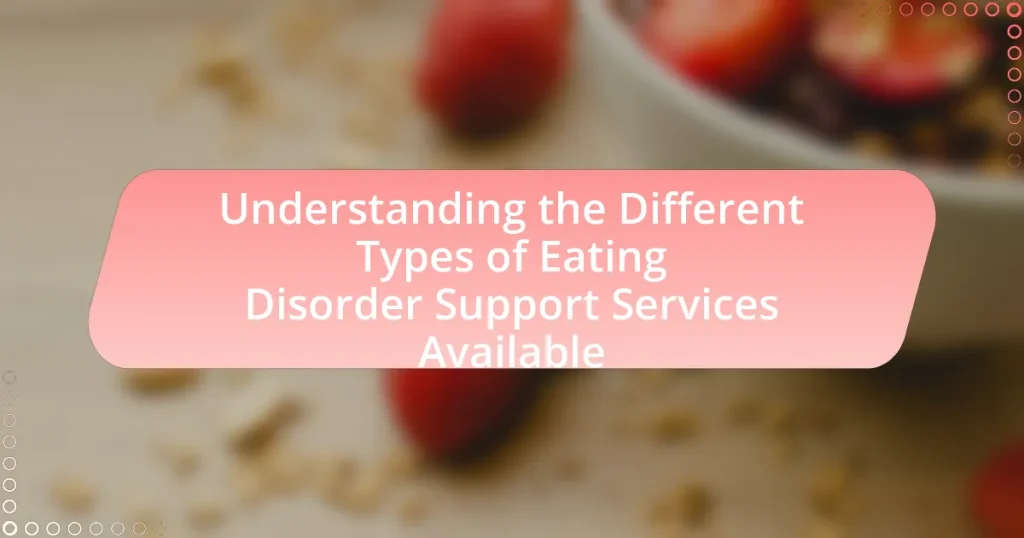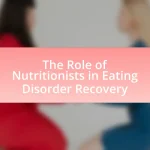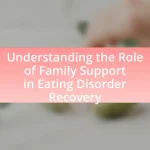The article focuses on the various types of eating disorder support services available, including outpatient therapy, inpatient treatment programs, support groups, and nutritional counseling. It highlights how these services cater to specific eating disorders such as anorexia nervosa, bulimia nervosa, binge eating disorder, and avoidant/restrictive food intake disorder (ARFID). The importance of seeking support is emphasized, detailing the potential consequences of untreated eating disorders and the benefits of tailored interventions. Additionally, the article addresses challenges individuals may face when accessing support, including stigma and financial barriers, while providing strategies for effective communication and utilization of these services to enhance recovery outcomes.
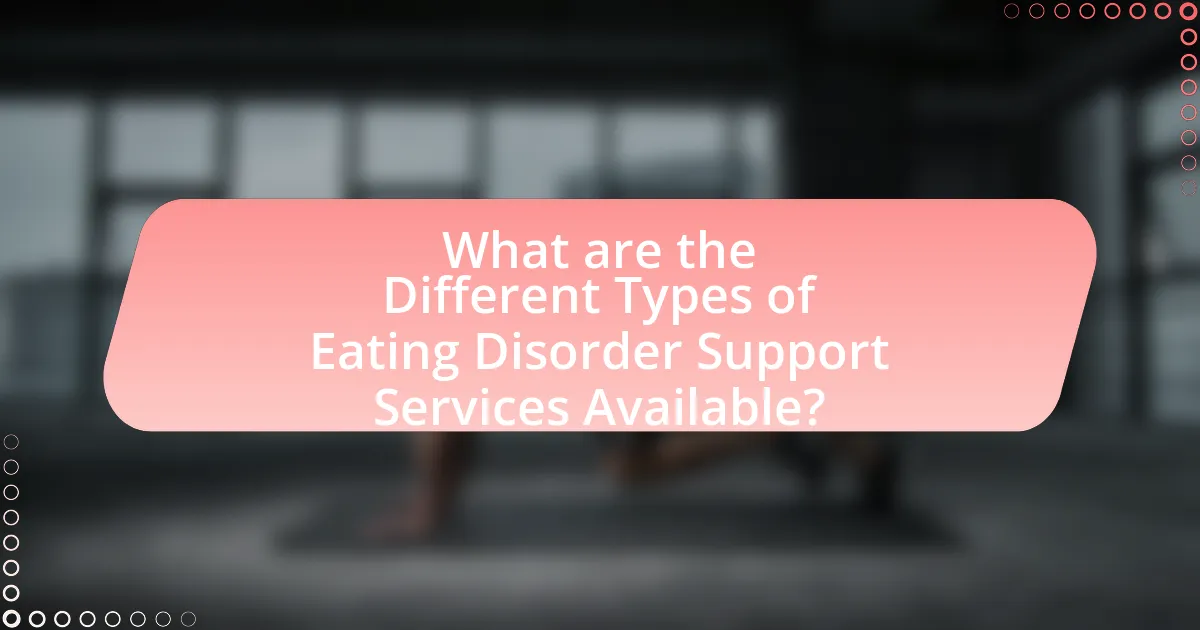
What are the Different Types of Eating Disorder Support Services Available?
Different types of eating disorder support services available include outpatient therapy, inpatient treatment programs, support groups, and nutritional counseling. Outpatient therapy provides individual or group sessions with mental health professionals, allowing patients to receive care while living at home. Inpatient treatment programs offer intensive care in a hospital or specialized facility, often necessary for severe cases. Support groups, facilitated by peers or professionals, provide a community for sharing experiences and coping strategies. Nutritional counseling focuses on developing healthy eating habits and addressing food-related issues with a registered dietitian. These services are essential for recovery, as they address the psychological, physical, and social aspects of eating disorders.
How do these support services cater to various eating disorders?
Support services cater to various eating disorders by offering tailored interventions that address the specific needs of individuals affected by conditions such as anorexia nervosa, bulimia nervosa, and binge eating disorder. These services typically include nutritional counseling, psychological therapy, and medical monitoring, which are designed to target the unique symptoms and challenges associated with each disorder. For instance, cognitive-behavioral therapy is often employed for bulimia to help modify harmful thought patterns, while structured meal plans are crucial for individuals with anorexia to promote healthy weight restoration. Research indicates that personalized treatment approaches significantly improve recovery outcomes, as evidenced by a study published in the Journal of Eating Disorders, which found that individualized care led to a 70% success rate in long-term recovery for patients with various eating disorders.
What specific eating disorders do these services address?
These services address specific eating disorders including anorexia nervosa, bulimia nervosa, binge eating disorder, and avoidant/restrictive food intake disorder (ARFID). Anorexia nervosa is characterized by extreme restriction of food intake and an intense fear of gaining weight. Bulimia nervosa involves cycles of binge eating followed by compensatory behaviors such as vomiting or excessive exercise. Binge eating disorder is marked by recurrent episodes of eating large quantities of food without subsequent purging. ARFID is defined by an avoidance of certain foods or food groups, leading to significant nutritional deficiencies. These definitions align with the Diagnostic and Statistical Manual of Mental Disorders (DSM-5), which provides the criteria for diagnosing these disorders.
How do the needs of individuals with different eating disorders vary?
Individuals with different eating disorders have varying needs based on the specific characteristics and symptoms of their conditions. For instance, those with anorexia nervosa often require intensive nutritional rehabilitation and psychological support to address severe weight loss and distorted body image, while individuals with bulimia nervosa may need a focus on managing binge-eating episodes and purging behaviors, alongside cognitive behavioral therapy to alter harmful thought patterns. Additionally, individuals with binge-eating disorder typically benefit from strategies aimed at emotional regulation and developing healthier eating habits, as they may not engage in compensatory behaviors but struggle with loss of control over eating. Each disorder necessitates tailored interventions that address the unique psychological, nutritional, and behavioral aspects associated with it, highlighting the importance of specialized treatment plans for effective recovery.
Why is it important to seek support for eating disorders?
Seeking support for eating disorders is crucial because it significantly enhances recovery outcomes and reduces the risk of severe health complications. Individuals with eating disorders often struggle with distorted body image, unhealthy eating patterns, and emotional distress, which can lead to life-threatening conditions. Research indicates that early intervention and support can improve recovery rates by up to 50%, as highlighted in a study published in the Journal of Eating Disorders by Treasure et al. (2015). Accessing support services provides individuals with the necessary tools, coping strategies, and professional guidance to address the psychological and physical aspects of their disorder effectively.
What are the potential consequences of untreated eating disorders?
Untreated eating disorders can lead to severe physical and psychological consequences. Physically, individuals may experience malnutrition, electrolyte imbalances, heart complications, and gastrointestinal issues, which can be life-threatening. Psychologically, untreated eating disorders often result in anxiety, depression, and social isolation, significantly impairing quality of life. According to the National Eating Disorders Association, approximately 20% of individuals with eating disorders die from complications related to the disorder, underscoring the critical need for timely intervention and support.
How can support services improve recovery outcomes?
Support services can improve recovery outcomes by providing tailored emotional, psychological, and practical assistance to individuals with eating disorders. These services, such as counseling, nutritional guidance, and peer support groups, create a supportive environment that fosters resilience and coping strategies. Research indicates that individuals who engage with support services experience higher rates of recovery; for instance, a study published in the Journal of Eating Disorders found that participants receiving structured support had a 50% higher likelihood of achieving sustained recovery compared to those without such services. This evidence underscores the critical role that comprehensive support plays in enhancing recovery trajectories for those affected by eating disorders.
What are the common types of eating disorder support services?
Common types of eating disorder support services include individual therapy, group therapy, nutritional counseling, and support groups. Individual therapy provides personalized treatment plans and coping strategies, while group therapy offers a shared experience and support from peers facing similar challenges. Nutritional counseling focuses on developing healthy eating habits and addressing nutritional deficiencies. Support groups create a community for individuals to share experiences and receive encouragement. These services are essential for recovery, as they address the psychological, emotional, and physical aspects of eating disorders.
What role do therapy and counseling play in support services?
Therapy and counseling are essential components of support services for individuals with eating disorders, as they provide a structured environment for emotional healing and behavioral change. These services facilitate the exploration of underlying psychological issues, such as trauma or anxiety, that contribute to disordered eating behaviors. Research indicates that cognitive-behavioral therapy (CBT) is particularly effective, with studies showing that it can lead to significant improvements in eating disorder symptoms and overall mental health. For instance, a meta-analysis published in the Journal of Eating Disorders found that CBT resulted in a 50% reduction in symptoms for many patients. Thus, therapy and counseling play a critical role in addressing both the psychological and emotional aspects of eating disorders, ultimately supporting recovery and promoting healthier coping mechanisms.
How do support groups contribute to recovery?
Support groups contribute to recovery by providing a sense of community and shared experience among individuals facing similar challenges. These groups facilitate emotional support, reduce feelings of isolation, and encourage accountability, which are crucial for individuals recovering from eating disorders. Research indicates that participants in support groups often report improved coping strategies and increased motivation to adhere to treatment plans, as evidenced by a study published in the Journal of Eating Disorders, which found that 70% of participants experienced enhanced recovery outcomes when engaged in peer support.
What is the significance of nutritional counseling in these services?
Nutritional counseling is significant in eating disorder support services as it provides tailored dietary guidance essential for recovery. This counseling helps individuals understand their nutritional needs, promotes healthy eating habits, and addresses the psychological aspects of food relationships. Research indicates that effective nutritional counseling can lead to improved outcomes in eating disorder treatment, as evidenced by a study published in the Journal of Eating Disorders, which found that patients receiving nutritional counseling alongside therapy showed a higher rate of recovery compared to those who did not.
How can individuals access these support services?
Individuals can access eating disorder support services through various channels, including healthcare providers, community organizations, and online resources. Healthcare providers, such as primary care physicians and mental health professionals, can offer referrals to specialized treatment centers and support groups. Community organizations often provide local resources, including helplines and support groups, which can be found through websites like the National Eating Disorders Association. Additionally, online platforms offer virtual therapy and support forums, making it easier for individuals to seek help from the comfort of their homes.
What are the steps to finding the right support service?
To find the right support service for eating disorders, follow these steps: first, assess your specific needs by identifying the type of support required, such as therapy, medical assistance, or nutritional guidance. Next, research available services in your area, focusing on those that specialize in eating disorders. After that, evaluate the qualifications and experience of the professionals involved, ensuring they have relevant certifications and a track record in treating eating disorders. Then, consider the service’s approach and philosophy to ensure it aligns with your values and preferences. Finally, reach out for consultations to gauge comfort and compatibility with the service before making a decision. These steps are essential for selecting a support service that effectively addresses individual needs and promotes recovery.
How can online resources assist in locating support services?
Online resources assist in locating support services by providing comprehensive databases, directories, and search tools that connect individuals with relevant services. Websites dedicated to mental health and eating disorders often feature searchable listings of local and national support groups, treatment centers, and hotlines, making it easier for users to find appropriate help. For instance, the National Eating Disorders Association (NEDA) offers a helpline and an online treatment finder that lists various support options based on location and specific needs. This accessibility to information empowers individuals to make informed decisions about their care and facilitates quicker access to necessary support services.
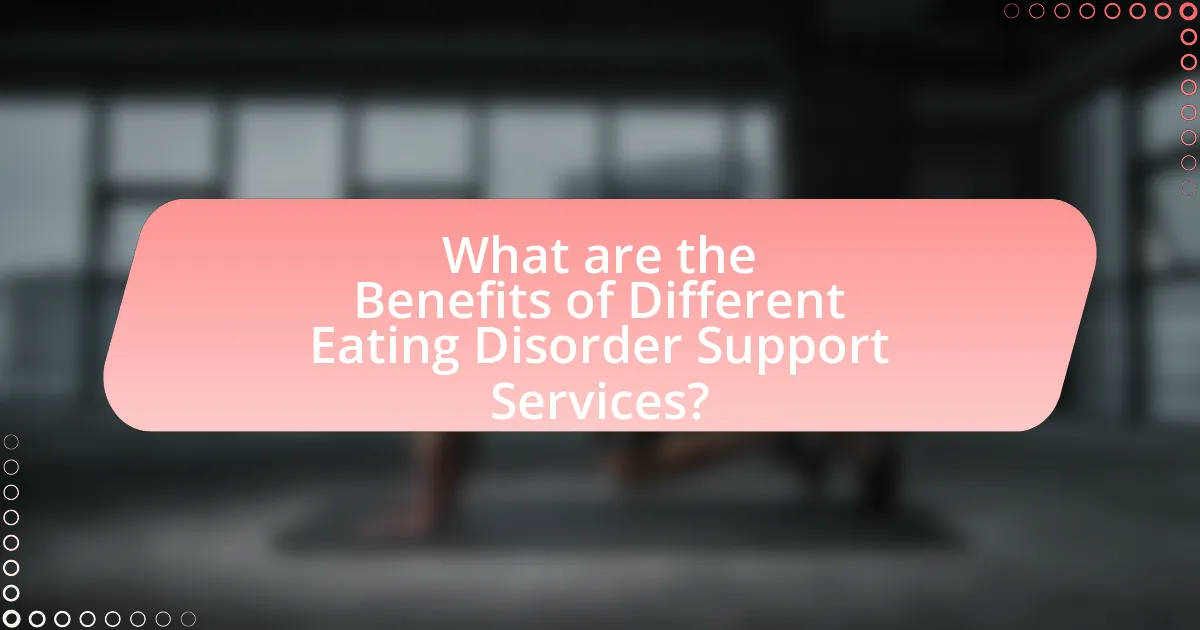
What are the Benefits of Different Eating Disorder Support Services?
Different eating disorder support services provide various benefits tailored to individual needs, enhancing recovery outcomes. For instance, therapy services, such as cognitive-behavioral therapy (CBT), help individuals identify and change negative thought patterns associated with eating disorders, leading to improved mental health. Group therapy offers social support, reducing feelings of isolation and fostering a sense of community among participants, which can be crucial for motivation and accountability. Nutritional counseling provides education on healthy eating habits, helping individuals develop a balanced relationship with food. Additionally, inpatient and outpatient treatment programs offer structured environments that facilitate intensive care and monitoring, which can be vital for severe cases. Research indicates that comprehensive support services significantly increase the likelihood of long-term recovery, as evidenced by a study published in the Journal of Eating Disorders, which found that individuals receiving multi-faceted support had a 70% higher recovery rate compared to those receiving minimal intervention.
How do individual therapy sessions benefit those with eating disorders?
Individual therapy sessions benefit those with eating disorders by providing personalized support and tailored interventions that address the specific psychological and emotional factors contributing to the disorder. These sessions allow individuals to explore their thoughts, feelings, and behaviors in a safe environment, facilitating self-awareness and insight into their eating patterns. Research indicates that cognitive-behavioral therapy, commonly used in individual sessions, has been effective in reducing symptoms of eating disorders, with studies showing that approximately 50-70% of individuals experience significant improvement after treatment. This therapeutic approach helps clients develop healthier coping mechanisms, improve body image, and establish a more positive relationship with food.
What techniques are commonly used in individual therapy?
Common techniques used in individual therapy include cognitive-behavioral therapy (CBT), dialectical behavior therapy (DBT), psychodynamic therapy, and mindfulness-based approaches. Cognitive-behavioral therapy focuses on identifying and changing negative thought patterns and behaviors, which is particularly effective for treating eating disorders by addressing distorted beliefs about food and body image. Dialectical behavior therapy combines cognitive-behavioral techniques with mindfulness strategies to help individuals manage emotions and improve interpersonal effectiveness. Psychodynamic therapy explores unconscious processes and past experiences that influence current behavior, providing insight into the underlying issues related to eating disorders. Mindfulness-based approaches encourage present-moment awareness and acceptance, which can reduce anxiety and promote healthier coping mechanisms. These techniques are supported by research indicating their effectiveness in treating various psychological issues, including eating disorders.
How does individual therapy address personal challenges?
Individual therapy addresses personal challenges by providing a safe and confidential space for individuals to explore their thoughts, feelings, and behaviors related to their eating disorders. This therapeutic approach allows clients to identify underlying issues, develop coping strategies, and set personal goals for recovery. Research indicates that individual therapy can lead to significant improvements in mental health outcomes, with studies showing that cognitive-behavioral therapy, a common form of individual therapy, is effective in reducing symptoms of eating disorders in approximately 50-70% of patients.
What advantages do group therapy sessions offer?
Group therapy sessions offer several advantages, including enhanced support, shared experiences, and diverse perspectives. Participants benefit from the collective wisdom and encouragement of others facing similar challenges, which can foster a sense of belonging and reduce feelings of isolation. Research indicates that group therapy can lead to improved emotional well-being, as individuals often feel validated and understood by peers. Additionally, the interactive nature of group therapy allows for the exchange of coping strategies and insights, which can enhance personal growth and recovery. Studies have shown that group therapy can be as effective as individual therapy for various mental health issues, including eating disorders, highlighting its value in treatment settings.
How does sharing experiences in a group setting help individuals?
Sharing experiences in a group setting helps individuals by fostering a sense of belonging and reducing feelings of isolation. When individuals share their personal stories, they often find common ground with others, which can enhance emotional support and validation. Research indicates that group therapy can lead to improved mental health outcomes, as participants report feeling understood and less alone in their struggles. For instance, a study published in the Journal of Consulting and Clinical Psychology found that group therapy significantly reduced symptoms of anxiety and depression among participants, highlighting the therapeutic benefits of shared experiences.
What are the dynamics of support in group therapy?
The dynamics of support in group therapy involve the interaction and relationships among participants that foster emotional healing and personal growth. In this setting, members share experiences, provide feedback, and offer encouragement, creating a sense of belonging and validation. Research indicates that group cohesion enhances therapeutic outcomes, as individuals feel less isolated and more understood, which is particularly beneficial for those dealing with eating disorders. A study published in the Journal of Consulting and Clinical Psychology found that group therapy significantly improved self-esteem and reduced symptoms of eating disorders among participants, highlighting the effectiveness of peer support in this context.
How does nutritional counseling enhance recovery?
Nutritional counseling enhances recovery by providing tailored dietary guidance that supports physical and mental health during the healing process. This specialized support helps individuals with eating disorders to establish healthy eating patterns, improve nutritional intake, and address any deficiencies, which are crucial for restoring overall well-being. Research indicates that individuals who engage in nutritional counseling experience improved outcomes, such as reduced symptoms of anxiety and depression, which are often associated with eating disorders. A study published in the Journal of Eating Disorders found that participants receiving nutritional counseling showed significant improvements in their eating behaviors and psychological health, demonstrating the effectiveness of this approach in facilitating recovery.
What specific dietary strategies are recommended in nutritional counseling?
Specific dietary strategies recommended in nutritional counseling include personalized meal planning, portion control, and the incorporation of a balanced diet rich in whole foods. Personalized meal planning tailors dietary choices to individual needs, preferences, and health goals, ensuring adherence and effectiveness. Portion control helps clients understand appropriate serving sizes, which can prevent overeating and promote mindful eating. A balanced diet emphasizes the consumption of fruits, vegetables, whole grains, lean proteins, and healthy fats, which supports overall health and can aid in recovery from eating disorders. These strategies are supported by research indicating that structured dietary approaches improve nutritional intake and psychological well-being in individuals undergoing treatment for eating disorders.
How does nutritional counseling address the psychological aspects of eating disorders?
Nutritional counseling addresses the psychological aspects of eating disorders by integrating dietary education with emotional support and behavioral strategies. This approach helps individuals understand the relationship between food, emotions, and behaviors, fostering healthier coping mechanisms. Research indicates that nutritional counseling can reduce anxiety and improve self-esteem in individuals with eating disorders, as it encourages mindful eating practices and promotes a balanced relationship with food. For instance, a study published in the Journal of Eating Disorders found that participants who engaged in nutritional counseling reported significant improvements in psychological well-being and reduced disordered eating behaviors.

What Challenges Might Individuals Face When Seeking Support?
Individuals seeking support for eating disorders may face several challenges, including stigma, lack of awareness, and accessibility issues. Stigma surrounding mental health and eating disorders can deter individuals from seeking help due to fear of judgment or misunderstanding. A study published in the Journal of Eating Disorders found that 60% of individuals with eating disorders reported feeling ashamed to seek help. Additionally, a lack of awareness about available support services can lead to individuals not knowing where to turn for assistance. Accessibility issues, such as financial constraints or limited availability of specialized services, further complicate the process of obtaining support. According to the National Eating Disorders Association, only 1 in 10 individuals with eating disorders receive treatment, highlighting the significant barriers that exist.
What barriers prevent individuals from accessing support services?
Barriers preventing individuals from accessing support services include stigma, lack of awareness, financial constraints, and limited availability of services. Stigma surrounding mental health and eating disorders often leads to feelings of shame, discouraging individuals from seeking help. A lack of awareness about available services can result in individuals not knowing where to turn for support. Financial constraints, such as the inability to afford treatment or lack of insurance coverage, further limit access. Additionally, in many areas, there is a shortage of specialized services, making it difficult for individuals to find appropriate support. These factors collectively hinder access to essential support services for those in need.
How can stigma surrounding eating disorders impact help-seeking behavior?
Stigma surrounding eating disorders significantly hinders help-seeking behavior by instilling feelings of shame and fear in individuals affected. This stigma often leads to a reluctance to seek treatment due to concerns about being judged or misunderstood by others, which is supported by research indicating that individuals with eating disorders frequently report feeling isolated and stigmatized (Murray et al., 2017, “The Impact of Stigma on Help-Seeking for Eating Disorders,” International Journal of Eating Disorders). Consequently, the fear of social repercussions can deter individuals from accessing necessary support services, ultimately exacerbating their condition and delaying recovery.
What financial challenges may arise when seeking support?
Financial challenges that may arise when seeking support for eating disorders include high treatment costs, lack of insurance coverage, and potential out-of-pocket expenses. Many treatment programs, especially residential or intensive outpatient services, can be prohibitively expensive, with costs ranging from several thousand to tens of thousands of dollars. Additionally, not all insurance plans cover eating disorder treatments, leading to significant financial burdens for individuals and families. According to the National Eating Disorders Association, only 30% of individuals with eating disorders receive treatment, often due to financial constraints. This highlights the critical impact of financial challenges on access to necessary support services.
How can individuals overcome these challenges?
Individuals can overcome challenges related to eating disorders by actively engaging with support services tailored to their needs. Accessing professional help, such as therapy or counseling, can provide individuals with coping strategies and emotional support. Research indicates that cognitive-behavioral therapy (CBT) is particularly effective, with studies showing a 50-70% improvement rate in patients with eating disorders who undergo this treatment. Additionally, joining support groups allows individuals to connect with others facing similar struggles, fostering a sense of community and shared understanding. Utilizing these resources can significantly enhance recovery outcomes and provide individuals with the tools necessary to manage their eating disorders effectively.
What resources are available to assist with financial barriers?
Financial assistance resources for individuals facing barriers include government programs, non-profit organizations, and community support services. Government programs such as Medicaid and Medicare provide coverage for mental health services, including treatment for eating disorders. Non-profit organizations like the National Eating Disorders Association offer financial assistance programs and can connect individuals with local resources. Additionally, community health centers often provide sliding scale fees based on income, making treatment more accessible. These resources collectively aim to alleviate the financial burden associated with seeking help for eating disorders.
How can community awareness initiatives reduce stigma?
Community awareness initiatives can reduce stigma by educating the public about eating disorders and promoting understanding of their complexities. These initiatives often involve workshops, campaigns, and informational sessions that dispel myths and provide accurate information about the causes and effects of eating disorders. Research indicates that increased awareness leads to greater empathy and support for individuals affected by these conditions, as evidenced by a study published in the Journal of Eating Disorders, which found that communities with active awareness programs reported lower levels of stigma and discrimination. By fostering an informed community, awareness initiatives create an environment where individuals feel safe to seek help without fear of judgment.
What are some best practices for utilizing eating disorder support services?
To effectively utilize eating disorder support services, individuals should actively engage in open communication with their support team, including therapists and nutritionists. This practice fosters a collaborative environment where personalized treatment plans can be developed, enhancing the likelihood of recovery. Research indicates that individuals who maintain consistent communication with their support services experience better outcomes, as they can address challenges and adjust strategies in real-time. Additionally, participating in group therapy sessions can provide a sense of community and shared experience, which has been shown to reduce feelings of isolation and promote healing.
How can individuals effectively communicate their needs to support providers?
Individuals can effectively communicate their needs to support providers by being clear, specific, and honest about their experiences and requirements. Clear communication involves articulating feelings, symptoms, and any challenges faced, which helps providers understand the individual’s situation better. Specificity is crucial; for instance, stating particular triggers or preferences for treatment can guide providers in tailoring their approach. Honesty fosters trust and ensures that the support received aligns with the individual’s true needs. Research indicates that effective communication between patients and providers leads to improved treatment outcomes, as evidenced by a study published in the Journal of Health Communication, which found that patients who actively engage in discussions about their needs report higher satisfaction with care.
What strategies can enhance the effectiveness of support services in recovery?
To enhance the effectiveness of support services in recovery, implementing a personalized approach tailored to individual needs is essential. This strategy ensures that support services address the unique challenges faced by each person, leading to better engagement and outcomes. Research indicates that personalized treatment plans, which may include therapy, nutritional counseling, and peer support, significantly improve recovery rates for individuals with eating disorders. For instance, a study published in the Journal of Eating Disorders found that clients who received tailored interventions showed a 30% higher success rate in achieving recovery milestones compared to those receiving standard care. Additionally, integrating continuous feedback mechanisms allows support services to adapt and refine their strategies based on the evolving needs of individuals, further enhancing their effectiveness.
